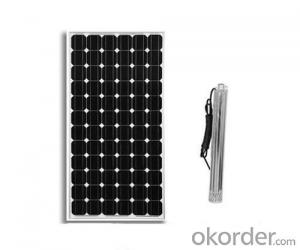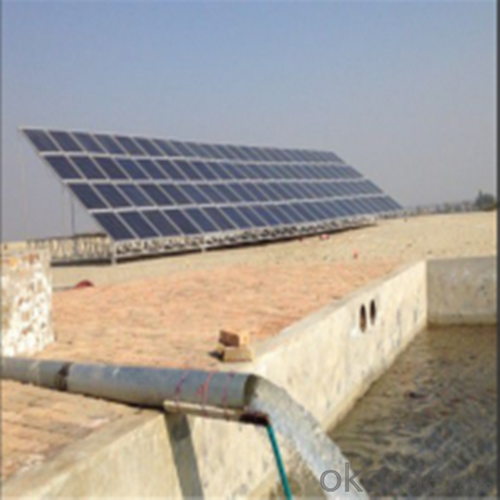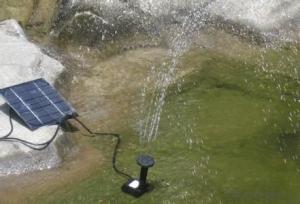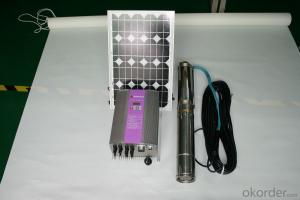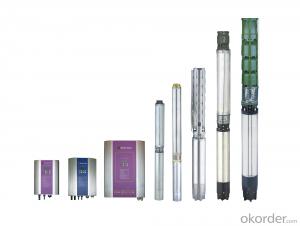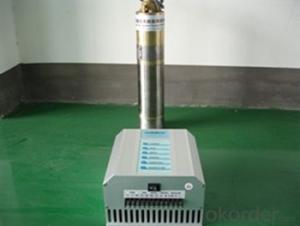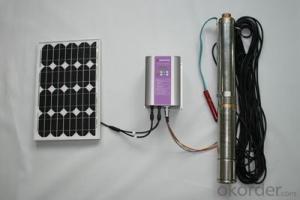Rainperfect Solar Pump Solar Water Panel for Irrigation
- Loading Port:
- Shanghai
- Payment Terms:
- TT OR LC
- Min Order Qty:
- 1 set
- Supply Capability:
- 1000 set/month
OKorder Service Pledge
OKorder Financial Service
You Might Also Like
Solar Water Panel Solar Pumps For Irrigation
DC solar water pumping system consists of the motor, pump, controller, solar array and some other accessories, such as water level sensor, float switch, etc. Considered that storing water is more efficient than storing electricity, the system is designed to directly drive the pump without battery which can reduce the construction and operating cost and routine maintenance effectively.The PV array consists of multiple solar panels connected in series/parallel, which can supply the whole system as power source by converting the absorbed solar radiation energy to the electrical energy. The pump driven by a brushless DC permanent magnet motor draws water from deep-well or river. The pumped water is then fed into reservoir or water tank, or connected to the irrigation system or fountain system directly.
Advanced Technology
Applications Innovation
The efficiency of DC brushless permanent magnet motor has been increased up to 25% in comparison with traditional asynchronous motor.
Technology Innovation
Stator and rotor are sealed by environment friendly casting resin.Motor insulation resistance can be hold higher than 300MΩfor more than 10 years, which consumedly increased the security and reliability of the submersible motor.
Structure Innovation
Casting resign technology processed stator and rotor as well as the water lubricated bearing make the submersible pump environment friendly.
Feature
High Efficiency & High Reliability
DC Brushless Permanent Magnet Motor
Minimum Maintenance, long Service Life
Environment Friendly Materials, Lubricated Without Oil
Application
Village or Family Water Supply
Animal Drinking Water & Livestock Watering
Garden/Courtyard Irrigation
Swimming Pool
Water Supply for Bivouac or Camping Car
Water Supply for Remote Area
Automatic Control
Operate Automatically, No Need Watching
Maximum Power Point Tracking (MPPT)
Dry-run Protection
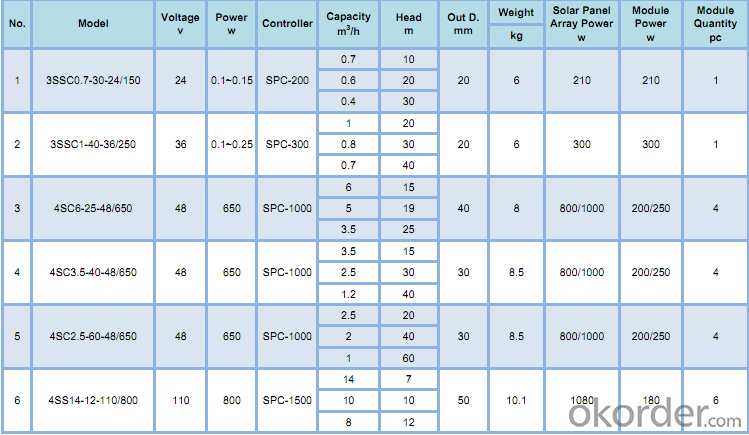
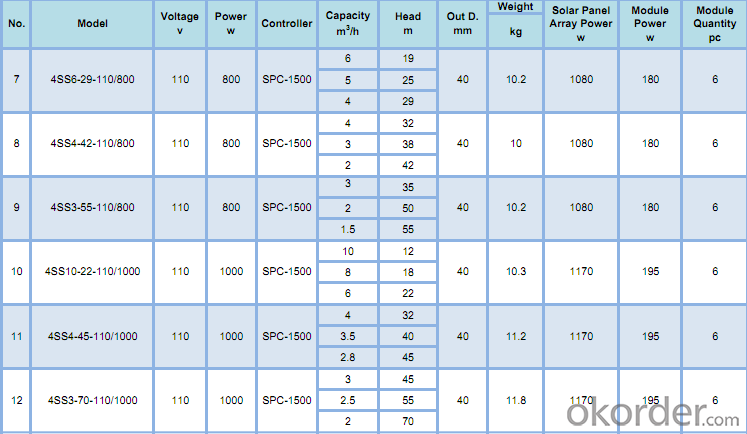
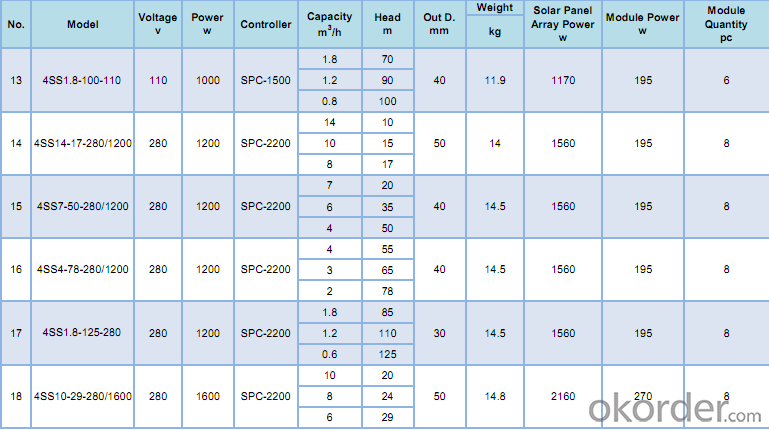
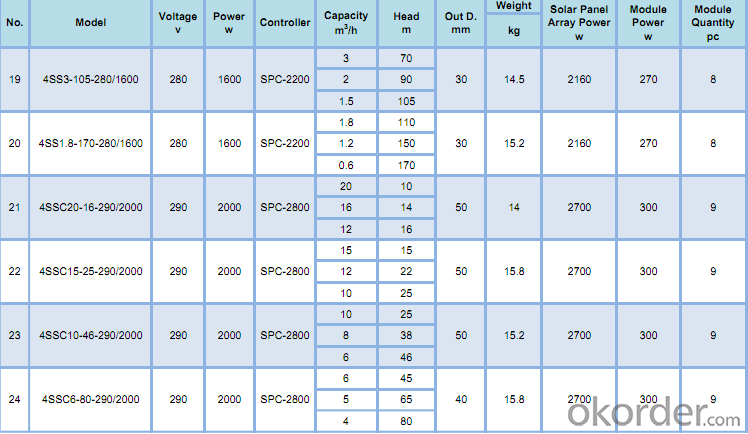
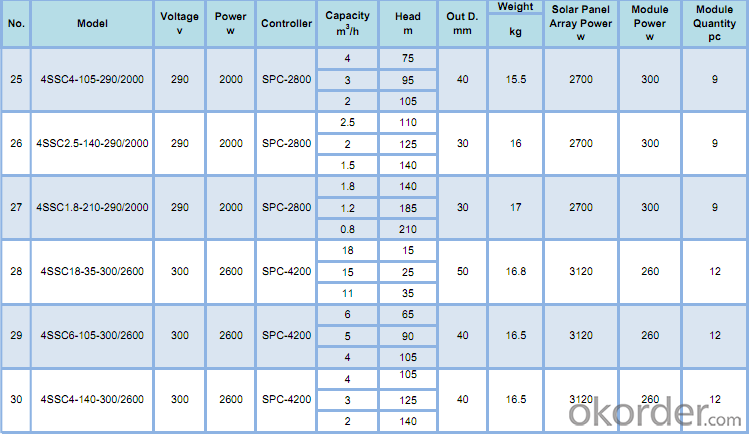
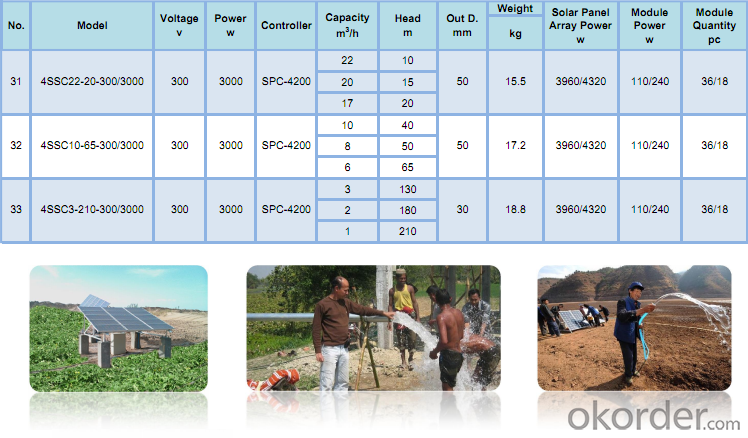
- Q: How does a solar pump help in promoting sustainable development?
- A solar pump helps in promoting sustainable development by harnessing the power of the sun to provide a clean and renewable source of energy for pumping water. It reduces the reliance on fossil fuels and electricity, which in turn decreases greenhouse gas emissions and air pollution. Furthermore, solar pumps enable access to water in remote areas where grid electricity is unavailable, improving agricultural productivity, providing safe drinking water, and supporting overall economic development. This sustainable solution not only conserves resources but also contributes to the social, economic, and environmental aspects of sustainable development.
- Q: How does a solar pump handle water quality monitoring?
- A solar pump typically does not handle water quality monitoring directly. However, additional devices or sensors can be integrated into the system to monitor water quality parameters such as pH levels, turbidity, chemical concentrations, or bacterial presence. These devices can be connected to the solar pump system and provide real-time data on water quality, allowing users to monitor and maintain the desired water quality standards.
- Q: Can a solar pump be used for pool circulation?
- Yes, a solar pump can be used for pool circulation. Solar pumps are designed to efficiently circulate and filter water using energy from the sun. They can be a cost-effective and environmentally friendly option for maintaining pool circulation and ensuring proper water filtration.
- Q: Are there any maintenance requirements for solar pumps?
- Solar pumps do require maintenance, although they are generally easier to maintain than traditional pumps. Regular maintenance is necessary to ensure optimal performance and longevity. To properly maintain a solar pump, the following tasks should be performed: 1. Clean the solar panels regularly to remove any accumulated dust, dirt, or debris. This will maximize the panels' efficiency and ensure sufficient power generation for the pump. 2. Periodically inspect the pump system, including the motor, pump, and connections, for any signs of damage or wear. Look out for loose or damaged wires, leaks, or any other issues that may affect pump performance. 3. Lubricate the moving parts of the pump as required. Follow the manufacturer's guidelines and recommendations to ensure smooth operation. 4. If the solar pump has a battery backup system, regular battery maintenance is crucial. This may involve checking battery levels, cleaning battery terminals, and replacing batteries if necessary. 5. It is advisable to have a professional service and inspect the solar pump system at least once a year. They can conduct more comprehensive checks, provide necessary repairs or replacements, and offer recommendations for optimal performance. By adhering to these maintenance requirements, solar pump owners can ensure efficient and effective operation, minimizing the risk of breakdowns and prolonging the pump's lifespan.
- Q: Can a solar pump be used for water supply in refugee camps or temporary settlements?
- Yes, a solar pump can definitely be used for water supply in refugee camps or temporary settlements. Solar pumps are a sustainable and cost-effective solution for providing clean and reliable water access in remote areas that lack electricity infrastructure. They harness solar energy to power the pump, eliminating the need for fuel or electricity, making them ideal for off-grid locations like refugee camps. Solar pumps can be easily installed and maintained, ensuring a continuous and uninterrupted water supply, which is crucial for meeting the basic needs of the displaced populations.
- Q: Can solar pumps be used in areas with high humidity or heavy rainfall?
- Yes, solar pumps can be used in areas with high humidity or heavy rainfall. The performance of solar pumps is not significantly affected by humidity or rainfall as long as they are properly installed and maintained. The solar panels are designed to withstand various weather conditions and can still generate electricity even in rainy or humid environments.
- Q: Can a solar pump be used for both water supply and irrigation?
- Indeed, a solar pump has the capability to cater to both water supply and irrigation needs. Its design enables it to extract water from sources like wells, rivers, or ponds, and subsequently pump it to the desired location. These applications can serve various purposes, including providing water for domestic use, livestock, and irrigation. Solar pumps prove to be particularly beneficial for irrigation, as they offer an eco-friendly and cost-effective solution. Their operation relies solely on abundant and renewable solar energy, reducing the dependence on electricity or fuel-powered pumps. This makes them especially suitable for areas that are remote or off-grid, where access to electricity may be unreliable or limited. Furthermore, solar pumps can be equipped with advanced features like timers and sensors, enabling automated irrigation systems. This ensures that crops receive the optimum amount of water at the appropriate time, promoting efficient water usage and maximizing crop yield. To sum up, solar pumps are highly versatile and can effectively fulfill both water supply and irrigation requirements. Their sustainable and environmentally friendly nature makes them a preferred choice for agricultural and water supply applications.
- Q: Can a solar pump be used for sewage pumping?
- Indeed, sewage pumping can be accomplished using a solar pump. The versatility of solar pumps allows them to be employed for various purposes, one of which is sewage pumping. By harnessing solar energy, these pumps operate in an environmentally friendly manner and prove cost-effective over the long term. Specifically designed for sewage pumping, these solar pumps possess a sturdy construction that enables them to handle the solid waste typically found in sewage systems. Moreover, they possess advantageous features such as self-cleaning mechanisms and high pumping capacities, ensuring efficient and dependable operation. By opting for a solar pump for sewage pumping, you not only reduce electricity expenses and carbon emissions, but you also acquire a dependable and sustainable solution for sewage management in areas lacking access to grid power.
- Q: Are there any limitations on the temperature range that solar pumps can operate in?
- Yes, there are limitations on the temperature range that solar pumps can operate in. Extreme cold temperatures can cause freezing of the water or damage to the pump components, while extremely high temperatures can lead to overheating and reduced efficiency. However, most solar pumps are designed to withstand a wide temperature range and can typically operate within a range of -20°C to 50°C (-4°F to 122°F) without major issues.
- Q: Can a solar pump be used in areas with extreme weather conditions?
- Yes, a solar pump can be used in areas with extreme weather conditions. Solar pumps are designed to withstand various weather conditions, including extreme heat, cold, and precipitation. They are built with durable materials and are sealed to protect them from moisture and dust. Additionally, solar pumps are equipped with temperature and overvoltage protection systems to ensure their safe operation in extreme weather conditions. However, it is important to choose a solar pump specifically designed for the intended weather conditions to ensure optimal performance and longevity.
Send your message to us
Rainperfect Solar Pump Solar Water Panel for Irrigation
- Loading Port:
- Shanghai
- Payment Terms:
- TT OR LC
- Min Order Qty:
- 1 set
- Supply Capability:
- 1000 set/month
OKorder Service Pledge
OKorder Financial Service
Similar products
Hot products
Hot Searches
Related keywords
